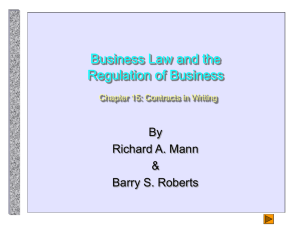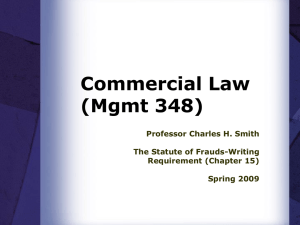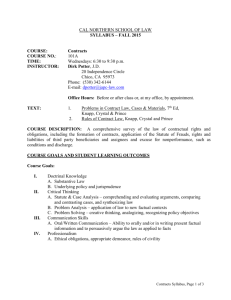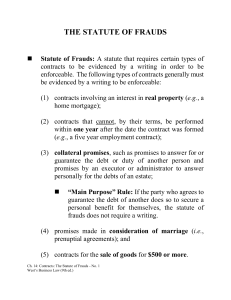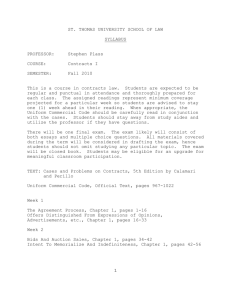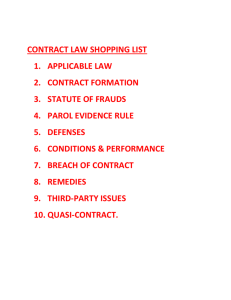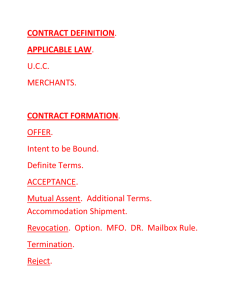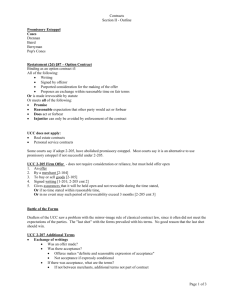RO 12 & 17
advertisement
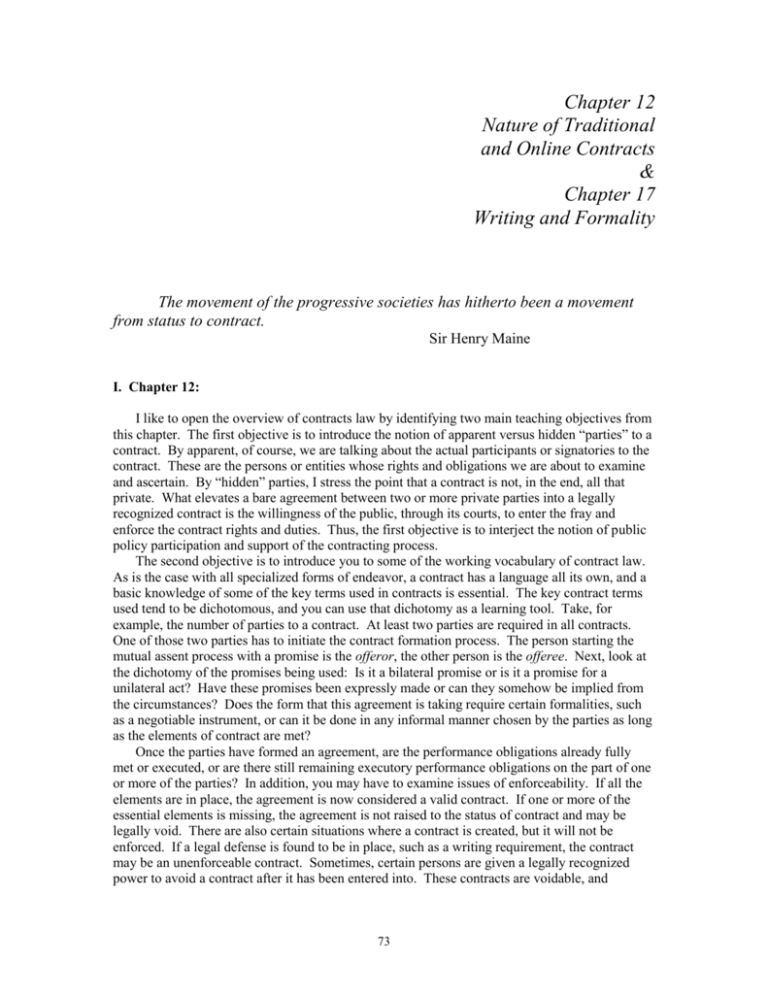
Chapter 12 Nature of Traditional and Online Contracts & Chapter 17 Writing and Formality The movement of the progressive societies has hitherto been a movement from status to contract. Sir Henry Maine I. Chapter 12: I like to open the overview of contracts law by identifying two main teaching objectives from this chapter. The first objective is to introduce the notion of apparent versus hidden “parties” to a contract. By apparent, of course, we are talking about the actual participants or signatories to the contract. These are the persons or entities whose rights and obligations we are about to examine and ascertain. By “hidden” parties, I stress the point that a contract is not, in the end, all that private. What elevates a bare agreement between two or more private parties into a legally recognized contract is the willingness of the public, through its courts, to enter the fray and enforce the contract rights and duties. Thus, the first objective is to interject the notion of public policy participation and support of the contracting process. The second objective is to introduce you to some of the working vocabulary of contract law. As is the case with all specialized forms of endeavor, a contract has a language all its own, and a basic knowledge of some of the key terms used in contracts is essential. The key contract terms used tend to be dichotomous, and you can use that dichotomy as a learning tool. Take, for example, the number of parties to a contract. At least two parties are required in all contracts. One of those two parties has to initiate the contract formation process. The person starting the mutual assent process with a promise is the offeror, the other person is the offeree. Next, look at the dichotomy of the promises being used: Is it a bilateral promise or is it a promise for a unilateral act? Have these promises been expressly made or can they somehow be implied from the circumstances? Does the form that this agreement is taking require certain formalities, such as a negotiable instrument, or can it be done in any informal manner chosen by the parties as long as the elements of contract are met? Once the parties have formed an agreement, are the performance obligations already fully met or executed, or are there still remaining executory performance obligations on the part of one or more of the parties? In addition, you may have to examine issues of enforceability. If all the elements are in place, the agreement is now considered a valid contract. If one or more of the essential elements is missing, the agreement is not raised to the status of contract and may be legally void. There are also certain situations where a contract is created, but it will not be enforced. If a legal defense is found to be in place, such as a writing requirement, the contract may be an unenforceable contract. Sometimes, certain persons are given a legally recognized power to avoid a contract after it has been entered into. These contracts are voidable, and 73 Chapter 9 examples of this sort of situation can be found in cases involving young people with limited mental capacity. II. Chapter Objectives Define contract. List the elements necessary to form a valid contract. Distinguish between bilateral and unilateral contracts. Describe and distinguish between express and implied-in-fact contracts. Describe and distinguish among valid, void, voidable, and unenforceable contracts. III. Key Question Checklist What body of contract law will control the formation, rights, duties, and remedies of this agreement? Are the four elements of a contract in place? How is this contract defined? Formal or informal? Executed or executory? Are there any defenses that make the contract unenforceable? IV. Text Materials Contracts are the basis for most of our activities. They are voluntarily entered into and the terms become a form of private law between the parties. Most are legally enforceable, with the breaching party being subject to damages ordered by the courts. Section 1: Definition of a Contract A contract is an agreement that is enforceable by a court of law or a court of equity. Parties to a Contract – The offeror makes the offer to the offeree. The contract is created when the offeree accepts the offer. Elements of a Contract – Enforceable contracts require that there be an offer and acceptance, which form an agreement between the parties. To be a contract the agreement must show mutual assent, consideration, capacity, and legality. Defenses to the Enforcement of a Contract - There are two defenses to the enforcement of a contract: genuineness of assent and writing and form. The Evolution of the Modern Law of Contracts – This fits in nicely with the notions of private versus public participants in the contract process as discussed in the teacher-to-teacher dialogue at the beginning of this chapter. It also allows you to get students thinking early on about the “battle of forms” and how the extensive use of forms has severely limited the real bargaining power of the average lay person. Section 2: Sources of Contract Law The Common Law of Contracts – This source of contract law developed from primarily state court decisions that became precedent. The Uniform Commercial Code (UCC) – The UCC has been adopted, in whole or in part, by every state, and takes precedence over common law. Article 2 deals with sales and Article 2A deals with leases. The Restatement of the Law of Contracts – The Restatement, currently in its second edition, is not law, but merely serves as guidance to the legal community. 74 Nature of Traditional and Online Contracts Objective Theory of Contracts – This theory applies the reasonable person standard to contracts. Uniform Electronic Commerce Act Adopted – The Uniform Computer Information Transactions Act (UCITA) establishes uniform legal rules for the formation and enforcement of electronic contracts and licenses. The Uniform Electronic Transactions Act (UETA) provides a legal framework for electronic transactions. Section 3: Classifications of Contracts Bilateral and Unilateral Contracts – A bilateral contract is a promise for a promise. The exchange of promises creates the enforceable contract. A unilateral contract is one where the offer can be accepted only by the performance of an act by the offeree. Incomplete or Partial Performance – Offers can be revoked by the offeror at any time before the offeree has begun performance. Express and Implied-in-Fact Contracts – Express contracts may be either oral or written, whereas implied-in-fact contracts are implied by the activities of the parties. Implied-in-fact contracts require that the plaintiff supply property or services to the defendant that they expected to be paid for, and that the defendant had an opportunity to reject the property or services and failed to do so. Quasi-Contracts (Implied-in-Law Contracts) – This is an equitable remedy that allows a court to award monetary damages to prevent unjust enrichment and unjust detriment in the case where there is no enforceable contract between the parties. Formal and Informal Contracts – Contracts may be formal, such as negotiable instruments, letters of credits, recognizances, and contracts under seal, or informal or simple contracts, like leases, sales contracts, and service contracts. The distinction is that formal contracts require a special format or method. Valid, Void, Voidable, and Unenforceable Contracts – Valid contracts meet all the essential elements and are enforceable by at least one of the parties. A void contract has no legal effect, and neither party can enforce it. Contracts where at least one party can avoid their contractual obligations are voidable contracts. If there is a legal defense to the enforcement of a contract, it is called an unenforceable contract, but the parties may choose to voluntarily perform the contract. Executed and Executory Contracts – Contracts that have not yet been fully performed by either side are called executory contracts; those that have been completed are executed contracts. Section 4: Equity Equity is resorted to when monetary damages are not sufficient or are not a proper remedy. Equity Saves Contracting Party – This explores a situation in which the court applied equitable remedies to protect the interests of lessees. The United Nations Convention on Contracts for the International Sale of Goods - The CISG applies to contracts for the international sales of goods. The buyer and seller must have their places of business in different countries. The United States, as well as many other countries, has ratified the CISG. V . Terms bilateral contract—A contract entered into by way of exchange of promises of the parties: a “promise for a promise.” 75 Chapter 9 common law of contracts—Contract law developed primarily by state courts. equity—A doctrine that permits judges to make decisions based on fairness, equality, moral rights, and natural law. executed contract—A contract that has been fully performed on both sides: a completed contract. executory contract—A contract that has not been fully performed. With court approval, executory contracts may be rejected by a debtor in bankruptcy. express contract—An agreement that is expressed in written or oral words. formal contract—A contract that requires a special form or method of creation. implied-in-fact contract—A contract where agreement between parties has been inferred from their conduct. informal contract—A contract that is not formal. Valid informal contracts are fully enforceable and may be sued upon if breached. legally enforceable contract—If one party fails to perform as promised, the other party can use the court system to enforce the contract and recover damages or other remedy. objective theory of contracts—A theory that says the intent to contract is judged by the reasonable person standard and not by the subjective intent of the parties. offeree—The party to whom an offer to enter into a contract is made. offeror—The party who makes an offer to enter into a contract. quasi- or implied-in-law contract—An equitable doctrine whereby a court may award monetary damages to a plaintiff for providing work or services to a defendant even though no actual contract existed. The doctrine is intended to prevent unjust enrichment and unjust detriment. Restatement of the Law of Contracts—A compilation of model contract law principles drafted by legal scholars. The Restatement is not law. unenforceable contract—A contract where the essential elements to create a valid contract are met, but there is some legal defense to the enforcement of the contract. Uniform Commercial Code—Comprehensive statutory scheme that includes laws that cover most aspects of commercial transactions. unilateral contract—A contract in which the offeror’s offer can be accepted only by the performance of an act by the offeree: a “promise for an act.” valid contract—A contract that meets all of the essential elements to establish a contract: a contract that is enforceable by at least one of the parties. void contract—A contract that has no legal effect: a nullity. voidable contract—A contract where one or both parties have the option to avoid their contractual obligations. If a contract is avoided, both parties are released from their contractual obligations. Chapter 17 Writing and Formality A verbal contract isn’t worth the paper it’s written on. Samuel Goldwyn “I’m a nurse. In nursing, we have a saying about documentation… If it’s not written down, it didn’t happen.” M. Taylor 76 Nature of Traditional and Online Contracts I. Chapter 17: As a practical matter, most contracts of any importance should be in writing. Most of you already intuitively know this. The more important concern is to recognize how, when, and where the writing should be used and when exceptions should be made to the general rule. I use a threestep logic that seems to work: 1. First, which categories of contracts are covered by the Statute of Frauds, including the major exceptions, such as partial performance or orders for specially made goods under the UCC. 2. Second, what is parol evidence rule 3. Finally, public policy and practical necessity of having exceptions to the parol evidence rule. The second set of defenses to the enforcement of contracts revolves around writing requirements associated with certain contracts. The genesis of the writing requirement for certain contracts is found in two roots: one historical and one practical. The historical root goes back to early English common law as developed under William the Conqueror and his successors. Status in that society was almost entirely measured by how much land one owned or had control over. Being Lord of the Manor meant privilege, power, and rank. Thus contracts involving the transfer of land ownership were of utmost importance because of the bearing they had on social status. Highly ritualized written processes of titled transfers to land evidenced these important contracts. The original title to the land was often traceable to a knights’s fief or fee for services provided to the sovereign. From this phrase, the highest recognized ownership in land today is still called fee simple absolute. The second root of the writing requirement is found on a more mundane level, having less to do with knights in shining armor and more with practicality. Writing is considered the best and most neutral evidence of the parties’ intent at the time the agreement was entered into. The writing does not lose its memory; it does not take sides. Thus when English lawmakers wrote the Statute of Frauds, they decided the statute would serve them with the best of both worlds, imposing a writing requirement on contracts to act as the best evidence in a court of law. The English version of the Statute of Frauds has been carried over to our legal system virtually intact. All U.S. states have adopted their own versions of the statute, and they are virtually uniform in that they require contracts involving interest in land, consideration of marriage, one-year rule, third-party guarantees, and others to be in writing. The most significant addition to this list came with the adoption of the Uniform Commercial Code. Under the provisions of the UCC, contracts for the sale of goods for more than $500 need to be in writing. Thus, the first question which needs to be answered is: Does the statute cover this contract or not? Once you have decided the contract is covered, what are the effects of having failed to reduce it to writing? Several possibilities may occur at this juncture. The parties may proceed to voluntarily perform the contract. But if one or both decide to assert the statute, its teeth are found in it being used as a defense to enforcement, i.e., if the party against whom contract enforcement is sought has not signed, it may not be enforced against him or her. There are equity-based exceptions to this general rule based on partial performance and promissory estoppel. Once the contract is finally reduced to writing, the next element of the Statute of Frauds takes hold: the parol evidence rule and the exceptions to it. Think of the parol evidence rule as being similar to Janus, the figure from Roman mythology, who was guardian of portals and patron of beginnings and endings. He faced both ways at once, symbolizing his power to let in or keep out the muses. So the parol evidence rule acts as a guardian of the gate of contract. The exclusion face of the rule states that the writing is intended to express the final intent of the parties. All 77 Chapter 9 prior or contemporaneous statements must ultimately have been reflected in writing and will remain barred from the interpretation of the instrument. This provision is designed to prevent a rewrite of the document after the fact with new evidence to prevent fraud. The converse is found in the exceptions to the parol evidence rule. Long ago, an anonymous legal scholar first said: “The Statute of Frauds should not be used to perpetuate frauds.” The exceptions to the parol evidence rule are designed to let in additional information not shown on the original writing in certain limited circumstances. These special circumstances are grounded in public policy and simple practical necessity. Public policy provides an overriding basis in cases involving fraud, misrepresentation, deceit, bad faith, power to avoid based on age or mental capacity, duress, undue influence, and mistake. All these elements are considered in the best interest of public policy and will be allowed into evidence, notwithstanding the statute, if the facts warrant it. The second area of exception to the parol evidence rule is explaining ambiguities. If the contract, as written, contains ambiguous language, parol evidence is allowable to clear the ambiguity as long as it is consistent with the original terms. The nature of the evidence allowable under this rule can range from oral statements made by the parties on up to entire standards of usage and trade used by a particular industry. This exception is particularly important in contracts covered by the UCC. Again the underlying theory is prevention of fraud. Just like Janus, fraud can be prevented by either keeping evidence in or out depending on the individual equities knocking at the contract door. II. Chapter Objectives List the contracts that must be in writing under the Statute of Frauds. Explain the effect of noncompliance with the Statute of Frauds. Describe how the Statute of Frauds is applicable to the sale of goods. Apply the parol evidence rule. III. Key Question Checklist Does the contract in question come under the writing requirements of the Statute of Frauds? Is there an exception to the writing requirement? If a writing is required, is it sufficient? How, where, and when should you use the parol evidence rule? IV. Text Materials Section 1: Statute of Frauds Each state has enacted a Statute of Frauds requiring certain types of contracts to be in writing. Writing Requirement – Most states require that any contracts involving real estate or the purchase of a business, contracts for a term greater than one year, promises to stand for the debt of another, contracts for the sale of goods over $500 must be in writing, agency or finders fee contracts, and promises to write a will. The courts have held that executory contracts that are not written will be treated as unenforceable; however, the courts will not allow parties to rescind oral contracts that have been executed, even if they should have been in writing. Section 2: Contracts That Must be in Writing 78 Nature of Traditional and Online Contracts Contracts Involving Interests in Land - All contracts that transfer interests in ownership of real property must be in writing. These include mortgages, leases, life estates, and easements. Part Performance Exception - This equitable doctrine is applied to oral contracts that have been partially performed where it is not possible to return the parties to status quo. One-Year Rule – This rule requires that contracts that cannot be performed within one year be in writing. Guaranty Contract – When one person agrees to answer for the debt of another, they enter into a contract with the original creditor on a primary contract. This guaranty contract must be in writing. The “Main Purpose” Exception – When the object of an oral collateral contract is to benefit the guarantor, the contract will be treated as an original contract and will not have to be in writing. Contracts for the Sale of Goods – Section 201 of the UCC requires that the sale of goods costing over $500 must be in writing. If a modification to a contract increases the sales price to above $500, the modification will have to be in writing, even though the original contract did not have to be. Agent’s Contracts - The equal dignity rule requires an agent’s contract to be in writing if they are to be enforced. Promises Made in Consideration of Marriage – Unilateral promises to pay money or property in consideration of a promise to marry must be in writing. An Oral Contract Isn’t Worth the Paper It’s Written On – New York court holds an oral contract is barred under the Statute of Frauds, even though it produces an unfair result, such as preventing people from collecting on service rendered. Promissory Estoppel – Equitable estoppel holds that an oral promise is enforceable if the promise induces another to act, that it is reasonable that they would rely upon the promise, and that injustice can only be avoided by enforcing the oral promise. Section 3: Formality of Writing Written contracts do not have to be drawn up by attorneys or formally typed, provided that it contains the essential terms of the parties’ agreement. Required Signature – The contract must be signed by the party against whom enforcement is sought anywhere in the writing. Chinese Chops and Japanese Hankos as Signatures - Some countries, such as Japan and China, use a stamp as their signature. It is much more difficult to prove forgery, since anyone with another’s hanko or chop can apply it. Integration of Several Writings – Incorporation by reference and implied integration are allowed under both common law and the UCC. Implied integration occurs when several documents are secured together in the same container or envelope. Interpreting Contract Words and Terms – If terms in a contract are not defined, and no glossary section is attached, the courts will apply standards of interpretation. Ordinary words are given the definitions stated in dictionaries and technical words are given their technical meaning, unless something else is clearly intended. Specific terms qualify general terms. Usage of trade will be applied if both parties are members of the same profession. Typed words prevail over preprinted words and handwritten terms prevail over both typed and preprinted words. Ambiguities are resolved against the party that drafted the contract. Merger or Integration Clause – This clause stipulates that the contract includes all items and will preclude the use of the parol evidence rule to introduce other writings. 79 Chapter 9 Parol Evidence Rule - Written contracts are considered to be a complete and final integration of the statements of the parties, and any prior or contemporaneous oral evidence that will alter, contradict, or amend the written contract is inadmissible. Exceptions to the Parol Evidence Rule - Oral evidence may be admitted to show that a contract is void or voidable, to explain ambiguous language, to prove a prior course of dealing or usage of trade, to fill gaps, or to correct obvious clerical or typographical errors. V . Terms collateral contract—A promise where one person agrees to answer for the debts or duties of another person. easement—A given or required right to make limited use of someone else’s land without owning or leasing it. equal dignity rule—A rule that says that agent’s contracts to sell property covered by the Statute of Frauds must be in writing to be enforceable. fixtures—Personal property that is permanently affixed to the real property, such as built-in cabinets in a house. guarantor—The person who agrees to pay the debt if the primary debtor does not. guaranty contract—The contract between the guarantor and the original creditor. incorporation by reference—When integration is made by express reference in one document that refers to and incorporates another document within it. integration—The combination of several writings to form a single contract. lease—A transfer of the right to the possession and use of the real property for a set term in return for certain consideration; the rental agreement between a landlord and a tenant. life estate—An interest in the land for a person’s lifetime; upon that person’s death, the interest will be transferred to another party. main purpose or leading object exception—If the main purpose of a transaction and an oral collateral contract is to provide pecuniary benefit to the guarantor, the collateral contract does not have to be in writing to be enforced. merger clause—A clause in a contract that stipulates that it is a complete integration and the exclusive expression of the parties’ agreement. Parol evidence may not be introduced to explain, alter, contradict, or add to the terms of the contract. mortgage—A collateral arrangement where a property owner borrows money from a creditor who uses a deed as collateral for repayment of the loan. One-year rule—An executory contract that cannot be performed by its own terms within one year of its formation must be in writing. parol evidence rule—A rule that says if a written contract is a complete and final statement of the parties’ agreement, any prior or contemporaneous oral or written statements that alter, contradict, or are in addition to the terms of the written contract are inadmissible in court regarding a dispute over the contract. parol evidence—Any oral or written words outside the four corners of the written contract. part performance—An equitable doctrine that allows the court to order an oral contract for the sale of land or transfer of another interest in real property to be specifically performed if it has been partially performed and performance is necessary to avoid injustice. promissory estoppel—An equitable doctrine that prevents the withdrawal of an offer by an offeror if it will adversely affect an offeree who has adjusted his position in justifiable reliance on the offer. real property—The land itself as well as buildings, trees, soil, minerals, timber, plants, crops, and other things permanently affixed to the land. 80 Nature of Traditional and Online Contracts Statute of Frauds—State statute that requires certain types of contracts to be in writing. UCC Statute of Frauds—A rule that requires all contracts for the sale of goods costing $500 or more and lease contracts involving payments of $1,000 or more to be in writing. 81
